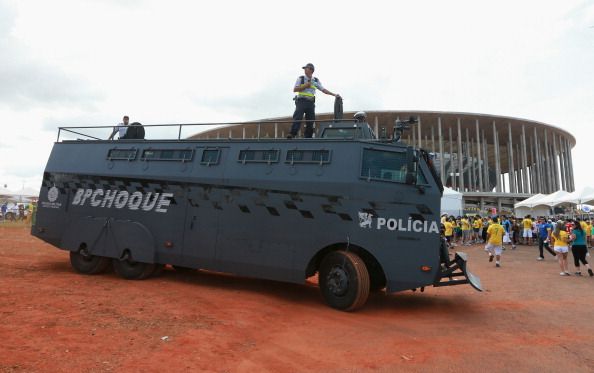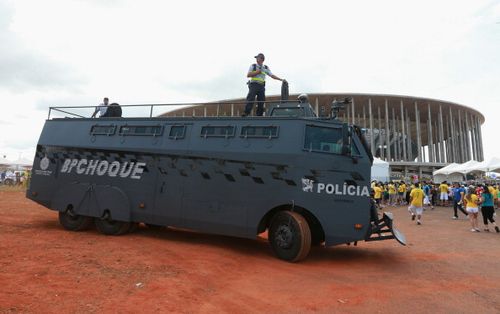
Brazil sends special police against 'Tropical Spring' demonstrations

Brazil has deployed special federal police to protect Confederations Cup venues, as mass “Tropical Spring” protests against government spending for the 2014 World Cup turn violent.
A day after more than 250,000 people took to the streets of major cities in mostly peaceful rallies, Brazil’s President Dilma Rousseff tried to get ahead of a wave of protests and publicly vowed on Tuesday to listen to the complaints.
But authorities were also taking no chances as protests turned violent in Sao Paulo and threatened to turn violent in other cities.
The National Force, a special federal police force called up in cases of social unrest, will be sent to five of the six cities where the Confederations Cup football tournament is being played.
The government reaction is notable given that the Confederations Cup is seen as a dry run for the World Cup next year.
The National Force, composed of police and firefighters from different states that are called up for duty on special occasions, is a “conciliatory, mediating” force, “not repressive,” the Justice Ministry said.
National Force police however were not in a conciliatory mood Sunday when they fired tear gas and rubber bullets at protesters in Rio de Janeiro outside the Maracana stadium.
The Confederations Cup opened June 15 and lasts for two weeks. Eight national teams from around the world are participating.
More protests are expected Wednesday in Fortaleza, in Ceara state, and Thursday in various Brazilian cities.
In all, Brazil is set to shell out some $15 billion (11 billion euros) on sporting events through to the World Cup in 2014. Rio de Janeiro, where real estate and rental prices have soared to exorbitant levels, will also host the 2016 summer Olympics.
Protests that were sparked by a hike in bus fares in Sao Paulo quickly spiralled into nationwide marches against corruption, fuelled by anger that — in a country with one of the widest income disparities in the world — billions of dollars were being spent on stadiums and little on social programs.
The protests that have snowballed over nearly two weeks have prompted loose comparisons with the Arab Spring demonstrations in North Africa and the Middle East.
“This is the start of the Tropical Spring,” said Givalnido Manoel, a protester in Sao Paulo.
Some 50,000 people marched on Tuesday in protest to the city hall in Sao Paulo, Brazil’s most populous city and the nation’s industrial capital. Several hundred of the protesters peeled off from the main group and set a car and a police stand on fire.
Police fired rubber bullets and tear gas to disperse the crowd, but many returned and broke into stores, taking off with jewlery, clothing and TV sets.
Protests also took place in scores of smaller cities, including the northeastern town of Juazeiro do Norte, where police hid the Mayor Raimundo Macedo inside a container truck for several hours as protesters angry at pay cuts for teachers swarmed the streets.
Rousseff on Tuesday tried to empathize with the protesters.
“These voices need to be heard,” she said in an address at the presidential palace. “My government is listening to these voices for change.”
“My government is committed to social transformation,” she added, hailing what she called the largely peaceful nature of the protests.
Rousseff flew to Sao Paulo to meet her predecessor and mentor, the still popular former president Luiz Inacio Lula da Silva (2003-2010), and reportedly the city mayor, Fernando Haddad, for talks on ways to defuse the popular ire.
All three belong to the leftist Worker’s Party (PT), in power since Lula first took office in 2003.
Several players from the national football squad expressed solidarity with the protests.
Chelsea defender David Luiz led his Brazil teammates in speaking out.
“I’m in favour of demonstrations without violence,” Luiz told reporters prior to Brazil’s Conderations Cup match against Mexico in Fortaleza.
Luiz’s international teammate Dani Alves, the Barcelona full-back, also gave his backing to the protesters, who are mostly young people.
Demonstrations on Monday were the most numerous in Brazil since 1992, which led to the impeachment of then president Fernando Collor de Mello on corruption charges.
Brazil’s protests are similar to those in places like Turkey and Egypt, said economist Andre Perfeito.
In the last decade, 40 million Brazilians rose into the middle class, “which today covers more than half of the population,” said Perfeito. The country experienced an explosion in consumer spending, and consumer debt.
That stability however is threatened as Brazil’s once red-hot economy sputters.
“I don’t want any more corruption, and I don’t want Brazilians to pay such high taxes with nothing in return. There is a lack of investment in education, health and public transportation,” said protester Marina Santos, 17, summarizing the bile of many demonstrators.